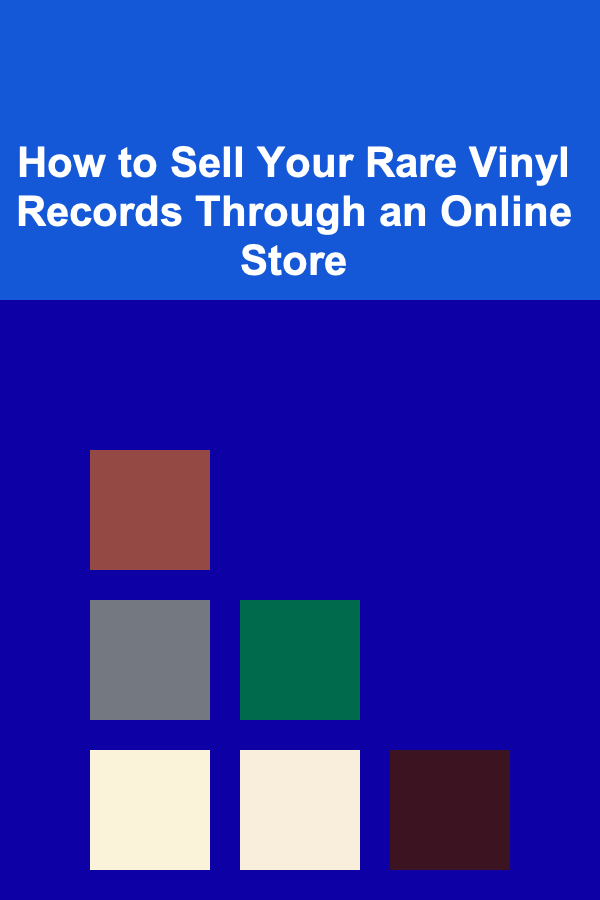
How to Sell Your Rare Vinyl Records Through an Online Store
ebook include PDF & Audio bundle (Micro Guide)
$12.99$11.99
Limited Time Offer! Order within the next:

Selling rare vinyl records can be an exciting way to share your collection with a broader audience while making a profit. However, the process involves more than simply listing records online; it requires careful planning, knowledge of the market, and effective marketing strategies to stand out in a competitive space. This guide will walk you through actionable steps to help you successfully sell your rare vinyl records through an online store.
Understand the Value of Your Records
Before listing your vinyl records for sale, it's essential to understand their value. The market for rare vinyl can be niche, and not all records are worth a significant amount of money. To determine the value of your collection, you need to consider several factors:
Key Factors Influencing Vinyl Record Value:
- Condition: The grading of a vinyl record, typically based on a scale of "Mint" to "Poor," significantly impacts its value. A well-maintained record in excellent condition will fetch more than one with scratches or warping.
- Rarity: Limited edition releases, first pressings, or records from niche genres (e.g., jazz, punk, or certain subcultures) are often more valuable.
- Artist and Label: Popular artists or those with a strong cult following (e.g., The Beatles, David Bowie, or Miles Davis) typically have higher market value.
- Cover Art: An album's cover art also plays a crucial role. Original, unblemished artwork adds value to a rare vinyl record.
Actionable Steps:
- Research Your Vinyl: Use online platforms like Discogs, eBay, and Popsike to research the current value of your records. These sites offer databases of sold prices and can help you get an accurate idea of what buyers are willing to pay.
- Grade Your Records: Learn how to properly grade your vinyl. Websites like Discogs have a comprehensive grading system that can help you assess the condition of your records and price them accordingly.
Set Up an Online Store
Once you've determined the value of your vinyl records, the next step is to set up an online store. There are several platforms where you can sell vinyl records, each with its advantages and potential downsides.
Popular Platforms for Selling Vinyl Records:
- Discogs: One of the largest online marketplaces for vinyl records, Discogs allows you to set up a storefront for your collection. It's specifically designed for collectors, so it's a great place to sell rare vinyl.
- eBay: A widely recognized platform with an auction-based system, eBay is excellent for selling rare and high-demand vinyl. The auction format can help drive the price up if the record is highly sought after.
- Etsy: Known for handmade and vintage items, Etsy is a great platform if you focus on niche or collectible vinyl records.
- Shopify: If you want complete control over your online store and branding, you can set up your own website using platforms like Shopify. This option requires more setup but offers more flexibility.
Actionable Steps:
- Create Accounts: Sign up for an account on the platform of your choice. Each platform has specific requirements for setting up a store, so take time to read the guidelines.
- Photograph Your Vinyl: High-quality photos are essential for online selling. Take clear, close-up images of the vinyl record itself, the cover art, and any inserts. If there's wear and tear on the cover or record, make sure to photograph these areas to provide transparency.
- Write Detailed Descriptions: For each record, write a detailed description that includes its condition, label information, pressing details, and any other relevant information. Be honest about imperfections to avoid returns and disputes.
Price Your Vinyl Records Strategically
Pricing is one of the most critical aspects of selling rare vinyl records. If you price your records too high, potential buyers might be turned off, but pricing them too low might lead to lost profit. Here's how you can strike the right balance:
How to Price Your Vinyl Records:
- Check Recent Sales: Look at what similar records are being sold for on platforms like Discogs and eBay. Pay attention to how the price changes based on the condition and rarity of the item.
- Factor in Fees: Some platforms charge listing fees, transaction fees, or commissions on sales. Make sure you account for these costs when setting your prices.
- Consider Auction vs. Fixed Price: On platforms like eBay, you can choose to auction your record or set a fixed price. Auctions work well if the record is highly sought after, while fixed prices are good for steady sellers.
- Start High, Negotiate: If you're unsure about the price, start higher and leave room for negotiation. Vinyl buyers often expect to haggle, so having a bit of wiggle room can be beneficial.
Actionable Steps:
- Research Comparable Listings: Use tools like the "sold" listings on eBay or Discogs' marketplace data to set a competitive price.
- Experiment with Pricing: If your records aren't selling, consider adjusting the price or offering discounts for bulk purchases. If your records are moving quickly, consider increasing the price slightly for future listings.
Market Your Vinyl Records
Now that you've set up your store and listed your vinyl records, you need to drive traffic to your listings. Marketing plays a crucial role in ensuring your rare vinyl records reach the right audience. Here are several strategies you can use:
Marketing Strategies:
- Social Media Marketing: Platforms like Instagram, Facebook, and Twitter are powerful tools for promoting your vinyl collection. Post high-quality images of your records, share music-related content, and engage with music communities.
- Engage with Niche Communities: Join vinyl record collector groups on Facebook, Reddit, or music forums. Engage with members by sharing your collection and offering valuable insights into the vinyl market.
- Email Marketing: If you have an existing audience or customer base, send out an email newsletter showcasing your latest rare vinyl records for sale. Offer exclusive discounts or promotions to incentivize purchases.
- Collaborate with Influencers or Bloggers: Reach out to music influencers or vinyl collectors who have large followings. They can help promote your store in exchange for records or a commission.
Actionable Steps:
- Create a Social Media Content Calendar: Plan out your social media posts, including album features, music trivia, and sales promotions. Consistency is key to building your audience.
- Use Hashtags: On Instagram and Twitter, use relevant hashtags (#vinylrecords, #vinylcollector, #rarevinyl) to make your posts discoverable to a broader audience.
- Offer Special Promotions: Run occasional sales, bundle deals, or giveaways to attract new customers and incentivize purchases.
Provide Excellent Customer Service
Customer service is key to building a successful online business. Even when selling rare items like vinyl records, providing a positive buying experience can lead to repeat customers and positive reviews.
How to Provide Exceptional Service:
- Respond Quickly to Inquiries: Whether a buyer has a question about a record's condition or shipping details, respond promptly and politely. Good communication fosters trust.
- Ensure Safe Packaging: Vinyl records are fragile, so make sure you package them securely. Use protective sleeves, cardboard mailers, and bubble wrap to ensure the records arrive in perfect condition.
- Offer Refunds or Returns: Although returns are not always standard with vinyl records, offering a reasonable return policy can help boost buyer confidence, especially for high-ticket items.
Actionable Steps:
- Track Orders and Provide Updates: Keep customers informed about the status of their orders. Include tracking numbers and estimated delivery dates.
- Ask for Feedback: After a sale, ask your customers to leave reviews on your online store. Positive reviews will build credibility and attract new buyers.
Stay Organized and Keep Records
Finally, as you sell more vinyl records, it's important to stay organized. Tracking sales, inventory, expenses, and profits ensures that your business runs smoothly and legally.
How to Stay Organized:
- Maintain an Inventory List: Keep a detailed list of the records you have for sale, including their condition, price, and any associated details like pressing information.
- Use Accounting Tools: Tools like QuickBooks, Xero, or even Google Sheets can help you track your income and expenses, especially if you plan to scale your vinyl sales business.
Actionable Steps:
- Use a Sales Tracking System: Implement a system for tracking sales, whether it's through the platform's built-in features or a third-party solution.
- Keep Receipts and Documents: Retain receipts for shipping costs, platform fees, and any purchases made for your business. These will help when filing taxes.
Conclusion
Selling rare vinyl records online can be a profitable and rewarding endeavor, but success requires more than just listing items on a marketplace. By understanding the value of your records, pricing them strategically, effectively marketing your store, and providing excellent customer service, you can build a loyal customer base and turn your passion for vinyl into a thriving business. Stay organized, engage with the vinyl community, and keep learning about the market to ensure long-term success.

How to Maximize Space in Your Garage with Smart Organization
Read More
Stylish Yet Affordable: Thrifty Gift-Wrapping Ideas for Budget-Conscious Shoppers
Read More
How to Understand Different Coffee Bean Varieties (Arabica, Robusta)
Read More
How To Leverage Memes and Trends for Engagement
Read More
How to Bake with Natural Sweeteners
Read More
Debunking the QAnon Phenomenon: A Comprehensive Guide
Read MoreOther Products

How to Maximize Space in Your Garage with Smart Organization
Read More
Stylish Yet Affordable: Thrifty Gift-Wrapping Ideas for Budget-Conscious Shoppers
Read More
How to Understand Different Coffee Bean Varieties (Arabica, Robusta)
Read More
How To Leverage Memes and Trends for Engagement
Read More
How to Bake with Natural Sweeteners
Read More